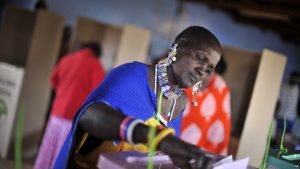2022 presents some small strides forward for Kenyan women in politics
Kenya has just concluded her general elections on 9th August as mandated by the constitution. This year’s elections were interesting- from a gender perspective- as 3 out of the 4 presidential contestants had female running mates, who would become deputy presidents in the event of a win. The contestant who didn’t pick a woman, instead, signed a comprehensive charter with women voters (through a delegation) as a way to pledge support for matters affecting them.
From the results that were officially announced by the Chair of the Independent Electoral and Boundaries Commission (IEBC) on 14th August 2022, more women were elected to different capacities compared to the previous elections (2013, 2017) following the passing of a new constitutional dispensation.
Up from 23 in 2017, 26 women have been elected as MPs in addition to the 47 reserved seats known as County Woman Representative/Woman Member of Parliament; in the Senate women have claimed 3 out of 47 positions-a drop by 1 in 2017 and 7 out of 47 in the gubernatorial position- up from 3 in 2017. These numbers, for MPs and Senators will be topped up by party nominations of more women to meet the 2/3 majority threshold.
The 2010 Constitution requires a two-thirds/one-third gender balance in Parliament. But the two male-dominated chambers have never passed a law to that effect, despite legal challenges to force their hand.
The number of elected women had already risen in 2017 to about 20% of the National Assembly. However, Kenya is still far behind some of its neighbours, such as Rwanda, in terms of parity. The political journey of Kenyan women is often fraught with difficulties, and that of the 2022 candidates was no exception.
Women have had a major breakthrough in this year’s elections, though the road ahead is still long and rough. The county of Nakuru, broke a record to have women elected both as Governor and Senator, in addition to the Woman representative position and 5 members of the county assembly- this is a first and a win for women in regards to elections and politics in the country. In Bomet County, 24 years old Linet Chepkorir AKA Toto was elected as the Woman Representative, a first for young women as well.
The victories capped a months-long election campaign that saw female

candidates subjected to a barrage of online abuse, including aggressive sexist language, gender stereotyping, and sexual overtures.
The International Federation for Human Rights and the Kenya Human Rights Commission warned ahead of the poll that such tactics were
“consciously deployed to prevent women politicians or candidates from participating in active politics”.
The elections were also marred by very high voter apathy with a 65.4% down from 80% in 2017.
